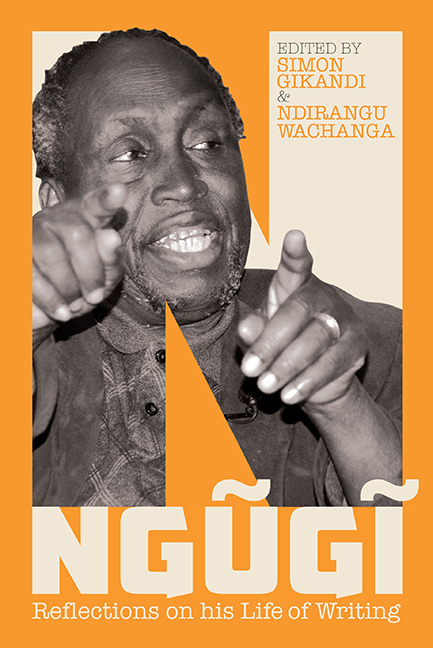Book contents
- Frontmatter
- Contents
- Preface
- Acknowledgements
- Chronology
- Photographic Section
- Introduction: Ngũgĩ wa Thiong'o: Reflections on His Life of Writing
- Ngũgĩ at Work
- Part I Serenades & Beginnings
- Part II Memories, Recollections & Tributes
- Part III Working with Ngũgĩ
- Part IV The Writer, the Critic & the World
- 23 Bricklayer & Architect of a World to Come
- 24 Revisioning Goethe's Idea of ‘World Literature’ [Commendation Address On the Awarding of the Dr. Phil. h.c. (Honorary Doctor of Letters) to Ngũgĩ wa Thiong'o, University of Bayreuth, Germany, April 2014]
- 25 Globalectics: Beyond Postcoloniality, & Engaging the Caribbean
- 26 Ngũgĩ & the Quest for a Linguistic Paradigm Shift: Some Reflections
- 27 Autobiographical Prototypes in Ngũgĩ wa Thiong'o's Early Fiction & Drama
- 28 Homecoming: The Idea of Return in the Works of Ngũgĩ wa Thiong'o
- 29 Gũcookia Rũĩ Mũkaro
- 30 Muthoni's Afterlives
- Part V The Other Ngũgĩ
- Appendixes
- References
- Bibliography of Ngũgĩ's Primary Works
- Works Cited
- Notes on Contributors
- Index
24 - Revisioning Goethe's Idea of ‘World Literature’ [Commendation Address On the Awarding of the Dr. Phil. h.c. (Honorary Doctor of Letters) to Ngũgĩ wa Thiong'o, University of Bayreuth, Germany, April 2014]
from Part IV - The Writer, the Critic & the World
Published online by Cambridge University Press: 27 July 2019
- Frontmatter
- Contents
- Preface
- Acknowledgements
- Chronology
- Photographic Section
- Introduction: Ngũgĩ wa Thiong'o: Reflections on His Life of Writing
- Ngũgĩ at Work
- Part I Serenades & Beginnings
- Part II Memories, Recollections & Tributes
- Part III Working with Ngũgĩ
- Part IV The Writer, the Critic & the World
- 23 Bricklayer & Architect of a World to Come
- 24 Revisioning Goethe's Idea of ‘World Literature’ [Commendation Address On the Awarding of the Dr. Phil. h.c. (Honorary Doctor of Letters) to Ngũgĩ wa Thiong'o, University of Bayreuth, Germany, April 2014]
- 25 Globalectics: Beyond Postcoloniality, & Engaging the Caribbean
- 26 Ngũgĩ & the Quest for a Linguistic Paradigm Shift: Some Reflections
- 27 Autobiographical Prototypes in Ngũgĩ wa Thiong'o's Early Fiction & Drama
- 28 Homecoming: The Idea of Return in the Works of Ngũgĩ wa Thiong'o
- 29 Gũcookia Rũĩ Mũkaro
- 30 Muthoni's Afterlives
- Part V The Other Ngũgĩ
- Appendixes
- References
- Bibliography of Ngũgĩ's Primary Works
- Works Cited
- Notes on Contributors
- Index
Summary
Anne Adams
In Globalectics, a book from 2012 on postcolonial literature, Ngũgĩ wa Thiong'o invokes Johan Wolfgang von Goethe to make the assertion that ‘the postcolonial is at the heart of the constitution of Goethe's world literature’ (55). He quotes Goethe's claim from the early nineteenth century that ‘ “[T]he epoch of world literature is at hand, and everyone must strive to hasten its approach” ’ (44). Ngũgĩ himself comments further:
One of the earliest to talk of a possible world literature, [Goethe] said that it could be fostered only by an untrammeled intercourse among all contemporaries … That was in 1801, in his journal Propyläen … For almost thirty years, between 1801 and 1831, in different fora, and in almost identical wording, he continued to restate that conviction. (Globalectics 44)
Ngũgĩ does acknowledge, of course, that Germany's most revered poet ‘may have been thinking of Europe’. Indeed, if we regard Goethe's continued reiteration of the ‘world-literature’ concept up to the end of his life, we see that he clearly was equating ‘world’ with Europe: In the draft for one issue of his Kunst und Alterthum (1829), he wrote ‘Erste Fassung: “Weltliteratur.” Zweite Fassung: “Europaische, d.h. Welt-Literatur” ’ (‘First version: “World Literature.” Second version: “European, i.e. World Literature” ’).
Taking the liberty myself to extend the reflections of the twenty-first-century Kenyan being celebrated today on the ideas of the nineteenth-century celebrated German, I would add another Goethe statement on world literature, which adds a bit more substance to the concept, although this time, addressing journals (1828):
Diese Zeitschriften, wie sie sich nach und nach ein grosseres Publikum gewinnen, werden zu einer gehofften allgemeinen Weltliteratur auf das wirksamste beitragen; nur wiederholen wir, das nicht die Rede sein konne, die Nationen sollen überein denken, sondern sie sollten nur einander gewahr werden, sich begreifen, und wenn sie sich wechselseitig nicht lieben mögen, sich einander wenigstens dulden lernen.
- Type
- Chapter
- Information
- NgugiReflections on his Life of Writing, pp. 135 - 142Publisher: Boydell & BrewerPrint publication year: 2018



